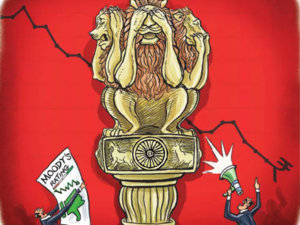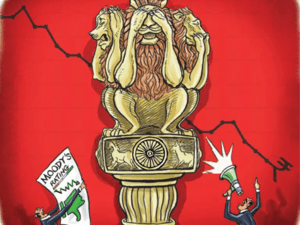View: To fix economy, change mindset – Moody’s and other assessments of India’s economic outlook must set alarm bells ringing


COVID-19 CASES
WorldIndiaConfirmed236,657Deaths6,642Confirmed6,734,088Deaths394,875This week, international ratings agency Moody’s downgraded India’s sovereign debt ratings and made the outlook negative. The same agency had upgraded India’s ratings in 2017. The government had highlighted this achievement back then. This time, the downgrade met with radio silence.
Moody’s assessment is no surprise. It is another piece of evidence that our economy is in bad shape, and not just due to the coronavirus. Moody’s statement read: “While today’s action is taken in the context of the coronavirus pandemic, it was not driven by the impact of the pandemic. Rather, the pandemic amplifies vulnerabilities in India’s credit profile that were present and building prior to the shock.”
The key reasons for Moody’s negative view were 1) lack of enough reforms to boost private investment; 2) poor implementation of stated policies; 3) stress in the financial sector; and 4) an inability to control government spending leading to rising deficits and debts. The most unflattering line in the Moody’s statement: “Governance is material to India’s credit profile and a material factor in today’s downgrade.”
Even after the corona crisis is over, India will just trudge along. It could have galloped if we did a few things right. We didn’t. The Moody’s report, like many other reports on our economy now, is screaming at us. It is urging us to take real action to fix our economy. We have had a stable and strong mandate since 2014. Since then, people who care about the economy more than insulting Pakistan have been frustrated. Things haven’t changed. Here are three reasons why we never fix our economy, no matter what.
First, Indian citizens just don’t care about the economy. Deface a temple, a mob will come after you. Teach Pakistan a lesson, millions will cheer you. Talk about the economy, people shrug, yawn and switch channels. Politicians mirror what people want. It isn’t about one person or even one government. When people start caring, leaders start caring.
Why don’t Indians care for the economy? It’s a confounding and fascinating question. Maybe Indians are not ambitious enough. Maybe we believe in fate too much. We think money will only come if God wants it, not if we all work for it. Or maybe we don’t like money or a better life. As long as we get tasty food and a bed to sleep in, it is enough.
Sadly, the net result of this economic apathy will be seen in the coming years. We will literally have an entire underemployed generation. You still can and will continue to get a graduate in India for less than Rs 7,500, or $100, a month. This is what a minimum wage McDonald’s burger flipper makes in the US, in one eight-hour shift (and no PPP nonsense explains this stark dichotomy.) As we become a nation of underpaid and underutilised clerks, as jobs dry up, hopefully the youth currently busy watching videos with their cheap 4G data packs will wake up.
Second, the government, whichever the political dispensation, is anti-business. This is a strong statement. I am sure many in government will rush to deny it. They will cite their favourite phrase – ‘ease of doing business.’ In the eyes of government, ease of doing business is an entrepreneur having tea and Marie biscuits with an IAS officer, where the latter allows the entrepreneur to do business. ‘See, where is the problem? India has ease of doing business,’ is what they will say.
However, ease of business is not ‘I, with power, am letting you do business easily.’ Ease of business happens when ‘I, even with my power, can’t easily stop or harm your business.’ This mental switch is impossible for our power wielders. In our ingrained caste-like mindset, business sits below netas and babus. In the US, the president openly sparred with the CEO of Twitter. The Twitter CEO knew that no matter what, the president cannot damage his business. Can you imagine that in India? Until that ‘I can’t hurt your business come what may’ comes from the netas and babus, doing business in India is never going to be easy.
Third, Indian industrialists lack innovation. A bit of blame also lies with Indian business owners as well. Most of them shun innovation, risk taking and don’t reward talent. Their main interest lies in promoting their children to top jobs (regardless of capabilities or talent), attending parties with other rich and powerful people (and feeling they are somebody in life) and for some, spending more money on weddings than India’s corona rescue package.
Sure, make your kids rich without making them do any work. But must they sit in the CEO’s seat? Why can’t they just live off the shares and dividends? Why not get someone talented to run your company? Indian business organisations like FICCI and CII (the guys who praise and call every budget a ‘game changer’) do a lot of events and conferences. In almost all of them, they talk about innovation. Almost always, they go back and do nothing about it.
Did you know that just the individual market capitalisation of Apple, Microsoft or Amazon – all new-age innovative companies – is close to the market cap of all Indian listed companies combined? Have you seen the truly innovative American entrepreneurs? Have you seen how they live and think? None of that inspires you? Is it only about who came for your birthday, and your next expensive car? Live a life with meaning, not inherited materialism.
India’s economy has not been in such a bad state for decades. If we don’t fix it, the next generation will suffer terribly. All of us – people, government and business owners – have to make drastic changes to our mindsets if we want to bring India’s economy back on track.
Source: indiatimes.com

